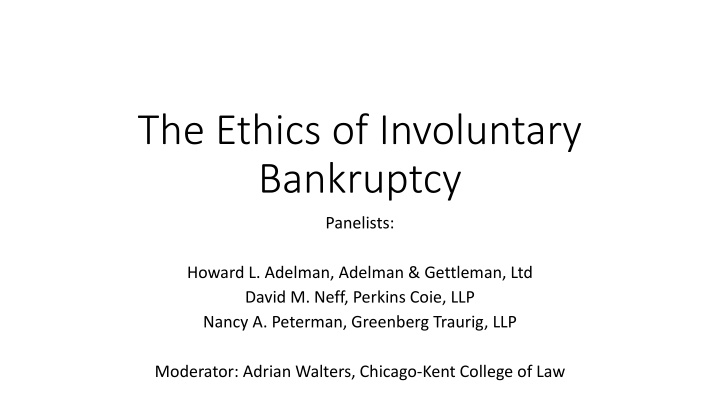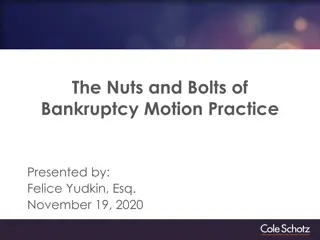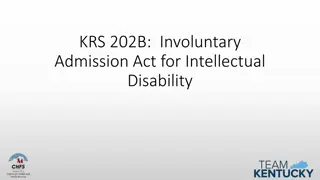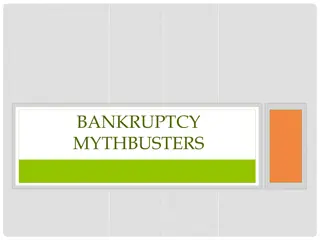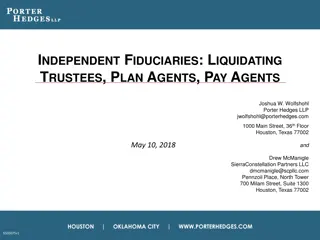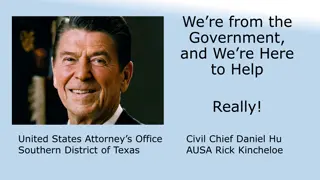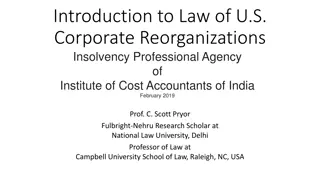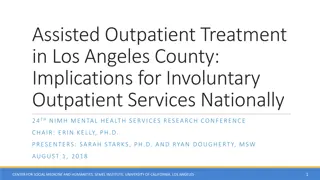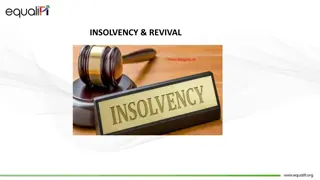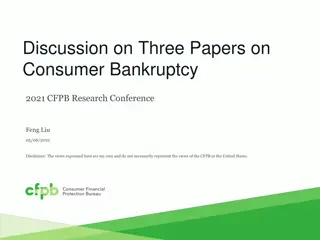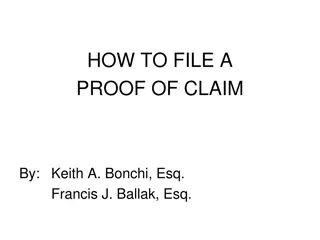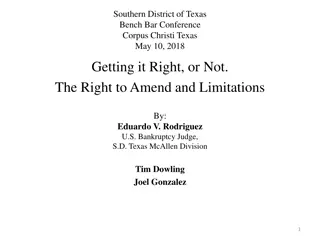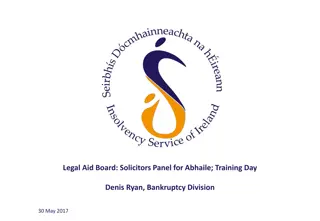Ethical Considerations in Involuntary Bankruptcy Cases
This content discusses three scenarios involving ethical dilemmas in the context of involuntary bankruptcy filings. From managers filing against fellow LLC members to lenders initiating bankruptcies for strategic reasons, the scenarios highlight complex issues such as creditor solicitation, usury defenses, and conflicts of interest. The situations present challenges that raise questions about legal and ethical boundaries in bankruptcy proceedings.
Download Presentation

Please find below an Image/Link to download the presentation.
The content on the website is provided AS IS for your information and personal use only. It may not be sold, licensed, or shared on other websites without obtaining consent from the author.If you encounter any issues during the download, it is possible that the publisher has removed the file from their server.
You are allowed to download the files provided on this website for personal or commercial use, subject to the condition that they are used lawfully. All files are the property of their respective owners.
The content on the website is provided AS IS for your information and personal use only. It may not be sold, licensed, or shared on other websites without obtaining consent from the author.
E N D
Presentation Transcript
The Ethics of Involuntary Bankruptcy Panelists: Howard L. Adelman, Adelman & Gettleman, Ltd David M. Neff, Perkins Coie, LLP Nancy A. Peterman, Greenberg Traurig, LLP Moderator: Adrian Walters, Chicago-Kent College of Law
SCENARIO 1: The manager and majority owner of an LLC is disappointed his fellow member holding 10% of the LLC (the 10% Member ) has refused to honor a current request by the manager to pay the 10% Member s share of the operating deficit, despite the fact that the controlling operating agreement only requires the 10% Member to fund losses at the conclusion of the project. The project is in process and the amount of the operating deficit is not yet determined. Upset with the 10% Member s refusal, the manager instructs his counsel ( Soliciting Counsel ) to pursue the solicitation of creditors to join the manager in filing an involuntary bankruptcy against the 10% Member even though the claim held by the LLC against the 10% Member has not yet matured. Soliciting Counsel sends a communication to persons alleged to be creditors of the 10% Member (the Alleged Creditors ) and solicits them to join in an involuntary bankruptcy case against the 10% Member. Soliciting Counsel to the LLC and manager fails to inform the Alleged Creditors that the claim of the LLC has not matured and is likely subject to a bona fide dispute, but nonetheless solicits such participation.
SCENARIO 2: Bluefin is the controlling noteholder in a group of lenders that holds the first mortgage on a resort hotel on a Caribbean island. The loan is under water and Bluefin is convinced that the resort would be worth much more if it can rid itself of its brand affiliation. Bluefin instructs the administrative agent for the loan to work with the borrower to craft a plan to file bankruptcy to reject the management agreement with the brand. The administrative agent is dubious of such a strategy and fortuitously for it, the resort is due to be reappraised and turns out that Bluefin is no longer in the controlling position. The new controlling noteholder agrees with the administrative agent that it should just proceed with its pending foreclosure of the resort. Undeterred, Bluefin devises a strategy to initiate an involuntary bankruptcy against the borrower in hopes the borrower will then seek to reject the management agreement under Section 365. To obtain the borrower s agreement for that course of action, Bluefin loans the borrower $300,000 to be used for its attorneys fees in connection with the bankruptcy case, which also makes Bluefin an unsecured creditor of the borrower. It then finds two small creditors on the Caribbean island to join in the involuntary petition, assuring them it will pay all attorneys fees related to the filing.
SCENARIO 3: Ursula Unsecured makes an unsecured loan to Bob Borrower in the original principal amount of $10,000, with a term of one year. The loan accrues interest at an annual rate of 25%, in a jurisdiction where interest rates are capped at 20%. One year passes, and Bob fails to pay any principal or interest. In response to a demand letter from Ursula seeking payment of $12,500, Bob candidly admits he owes the full amount of principal, but says he cannot pay. He also refuses to pay the interest component of the loan, raising the defense of usury. Ursula retains an attorney, Linda Lawyer, to file an involuntary bankruptcy case. Ursula provides Linda with documentation evidencing the loan to Ursula, and says she has two friends who are also owed money by Bob, and might be willing to join an involuntary petition: Marty Missing and Steve Secured. Marty Missing contacts Linda and tells her he made an unsecured loan to Bob in the amount of $3,000 pursuant to a written promissory note, and that Bob has failed to pay any portion of the loan by the due date. When asked whether Bob has any creditors who might be able to join an involuntary petition, Marty responds that he is well acquainted with Bob s finances, and that, while Bob has a number of smaller creditors, Ursula, Marty, and Steve collectively hold the vast majority of Bob s outstanding debt. Marty retains Linda and duly authorizes her to submit the involuntary petition on his behalf but afterward the initial meeting, Marty stops communicating with Linda, and fails to respond to Linda s emails requesting a copy of his promissory note and further information regarding Bob s finances. Steve Secured also asks Linda to represent him in connection with the prospective involuntary bankruptcy. Steve shows up to Linda s office with a stack of loan documents, including a security agreement granting Steve a first-priority security interest in a sailboat owned by Bob. These documents show that Bob owes Steve a total of $7,500, all of which is secured by the value of the sailboat. Steve retains Linda and authorizes her to submit the involuntary petition on his behalf.
SCENARIO 4: Acme Corporation is in dire financial straits, failing to pay its trade creditors promptly and accruing a significant amount of unpaid payroll tax obligations. In a last-ditch effort, Acme decides to discontinue its unprofitable WidgetsTM product line. In so doing, Acme stops doing business with suppliers of the products component parts, several of whom are owed substantial balances. One such supplier, Frenemy International, almost resigned itself to losing Acme s business without payment in full until it heard the other, similarly situated, former suppliers (the Other Suppliers ) recently received partial payment of the balances they were owed. Now, enraged being the only former supplier left out of this wave of payments, Frenemy is out for blood, and retains counsel ( Soliciting Counsel ) to file an involuntary bankruptcy petition against Acme. Frenemy instructs Soliciting Counsel to call the Other Suppliers (who are unrepresented) to ask whether they are willing to join the involuntary petition. Soliciting Counsel knows the Other Suppliers may not be benefited by a bankruptcy filing, because the payments they received from Acme may be avoidable as preferences. But on the other hand, Frenemy is bent on revenge, and no other creditors will return Soliciting Counsel s phone calls.
SCENARIO 5: ABC Corporation ( ABC ) is a competitor of NewCo Corporation ( NewCo ), as well as a creditor providing goods to NewCo. ABC is in substantially the same business as NewCo and services the same clientele as NewCo. Moreover, ABC is well aware that NewCo is likely to have in excess of 50 vendors providing various parts and services to NewCo. The contract between NewCo and ABC requires payment in 30 days. ABC has invoiced NewCo for goods in the amount of $10,000.00. The foregoing invoices remain unpaid more than 60 days after the due date. NewCo has not disputed the invoices. Counsel to ABC ( Soliciting Counsel ) performs a defendant s index search and discovers three lawsuits against NewCo seeking, in the aggregate, $250,000.00 (the NewCo Creditors ). In reviewing the dockets, Soliciting Counsel discovers that NewCo has filed answers disputing the NewCo Creditors. Soliciting Counsel nevertheless contacts counsel to each such creditor with a view toward joining ABC in an involuntary bankruptcy against NewCo, in the face of knowing that NewCo disputes the claims. Soliciting Counsel contends that, once the involuntary bankruptcy is filed, NewCo will be required to file a list of its creditors and Soliciting Counsel will be able to solicit other creditors to join the involuntary petition who may have undisputed claims.
